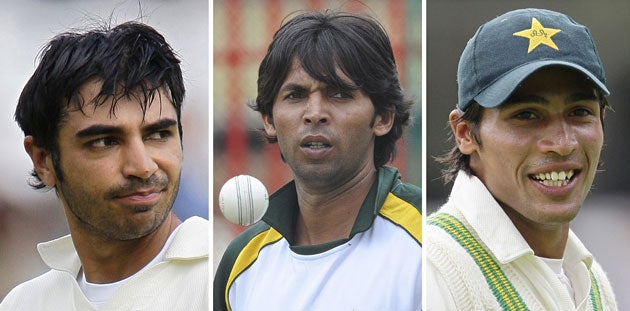ICC lay down the law in bid to fix the fixers
Pakistan trio are handed five-year bans as game's governors find their teeth

Three Pakistan cricketers who cheated in a Test match were all banned from the game for five years yesterday. The suspensions, the first to be imposed by the International Cricket Council, should reverberate throughout the world of cricket. Whether they will be sufficient to quell illegal betting is doubtful, but they should serve as a profound warning to others who might be tempted to cohabit with dodgy characters and distort the course of cricket matches.
After a five-hour hearing in Doha the panel that was set up by the ICC under their anti-corruption code announced its sentences on the trio after deciding they were guilty of malpractice in the Fourth Test between England and Pakistan at Lord's last August. Salman Butt, Pakistan's captain, and two fast bowlers, Mohammad Asif and Mohammad Amir, were charged with various offences, which they all denied.
Butt was banned for 10 years with five suspended, Asif for seven with two suspended and the teenager Amir for five. There had been widespread speculation that they would be banned for life, and until the panel's reasoning for its decision is published there is likely to be a feeling abroad that they got off lightly. Butt, 26, might be able to resurrect his career; Amir, 18, should still have years ahead, although he may struggle to fulfil his golden promise; Asif, 28, may well be finished.
Michael Beloff QC, the panel's chairman, urged the ICC to release the detailed findings as soon as possible. So committed to cleaning up the game is the ICC's chief executive, Haroon Lorgat, that publication could come as soon as tomorrow. Only the impending criminal charges brought by the Crown Prosecution Service in London on Friday are likely to delay it.
The players were caught in a sting orchestrated by the News of the World. Though the story failed to nail illegal bookmakers in India and their insidious influence on impressionable players, especially those from the subcontinent, there was no mistaking its significance. It did not prove match-fixing but it showed that it might exist.
Asif and Amir, with the collusion and encouragement of Butt, were said to have bowled no balls to order on the first and second days of the Lord's Test. Butt was also accused of deliberately playing out a designated maiden over in the Third Test at The Oval. In return their agent, Mazhar Majeed, who appeared to act as a middle man with the reporters posing as businessmen interested in illegal betting markets, was reported to have been paid £50,000. All was corroborated by taped and photographic evidence. England won the Lord's Test, which finished in sepulchral silence on the Sunday morning the newspaper made its sensational allegations. Never can a victory have seemed so hollow. The ICC, under the vibrant Lorgat, acted with unusual alacrity and quickly established a tribunal headed by Beloff, who was flanked by Justice Albie Sachs from South Africa and Sharad Rao from Kenya.
They began hearing initial submissions late last year and conducted a six-day hearing in Doha last month. Though the ICC were keen to be seen to be administering justice there and then, the players' lawyers successfully appealed for an adjournment. At last, yesterday Beloff delivered the decision and shed some light for the first time on the specifics of the charges that had been laid. The languagewas legalese but the interpretation was plain.
His statement said: "The tribunal found that the charge under Article 2.1.1 of the Code that Mr Butt agreed to bat out a maiden over in the Oval Test match played between Pakistan and England from 18 to 21 August 2010 was dismissed, whereas the charge under Article 2.4.2 that Mr Butt failed to disclose to the ICC's ACSU the approach by Mr Majeed that Mr Butt should bat out a maiden over in the Oval Test was proved.
"The Tribunal found that the charges under Article 2.1.1 of the Code that (respectively) Mr Asif agreed to bowl and did bowl a deliberate no ball in the Lord's Test match played between Pakistan and England from 26 to 29 August 2010, Mr Amir agreed to bowl and did bowl two deliberate no balls in the same Test, and Mr Butt was party to the bowling of those deliberate no balls, were proved."
That was damning in itself and the rationale behind the verdicts is likely to be compelling reading. The verdicts are subject to appeal and the Court of Arbitration for Sport will be busy. None of the players has so far expressed either guilt or contrition.
Beloff's statement said: "We impose the following sanctions: On Mr Butt a sanction of 10 years' ineligibility, five years of which are suspended on condition that he commits no further breach of the code and that he participates under the auspices of the Pakistan Cricket Board in a programme of Anti-Corruption education.
"On Mr Asif a sanction of seven years' ineligibility, two years of which are suspended on condition that he commits no further breach of the code and that he participates under the auspices of the Pakistan Cricket Board in a programme of Anti-Corruption education. On Mr Amir a sanction of five years' ineligibility. No further sanctions are imposed on any player and no orders are made as to costs."
Beloff concluded by suggesting there be greater flexibility about minimum sentences in exceptional circumstances. But the game was at last standing up to its responsibilities. Match-fixers may be tempted to think more than once.
Subscribe to Independent Premium to bookmark this article
Want to bookmark your favourite articles and stories to read or reference later? Start your Independent Premium subscription today.

Join our commenting forum
Join thought-provoking conversations, follow other Independent readers and see their replies
Comments